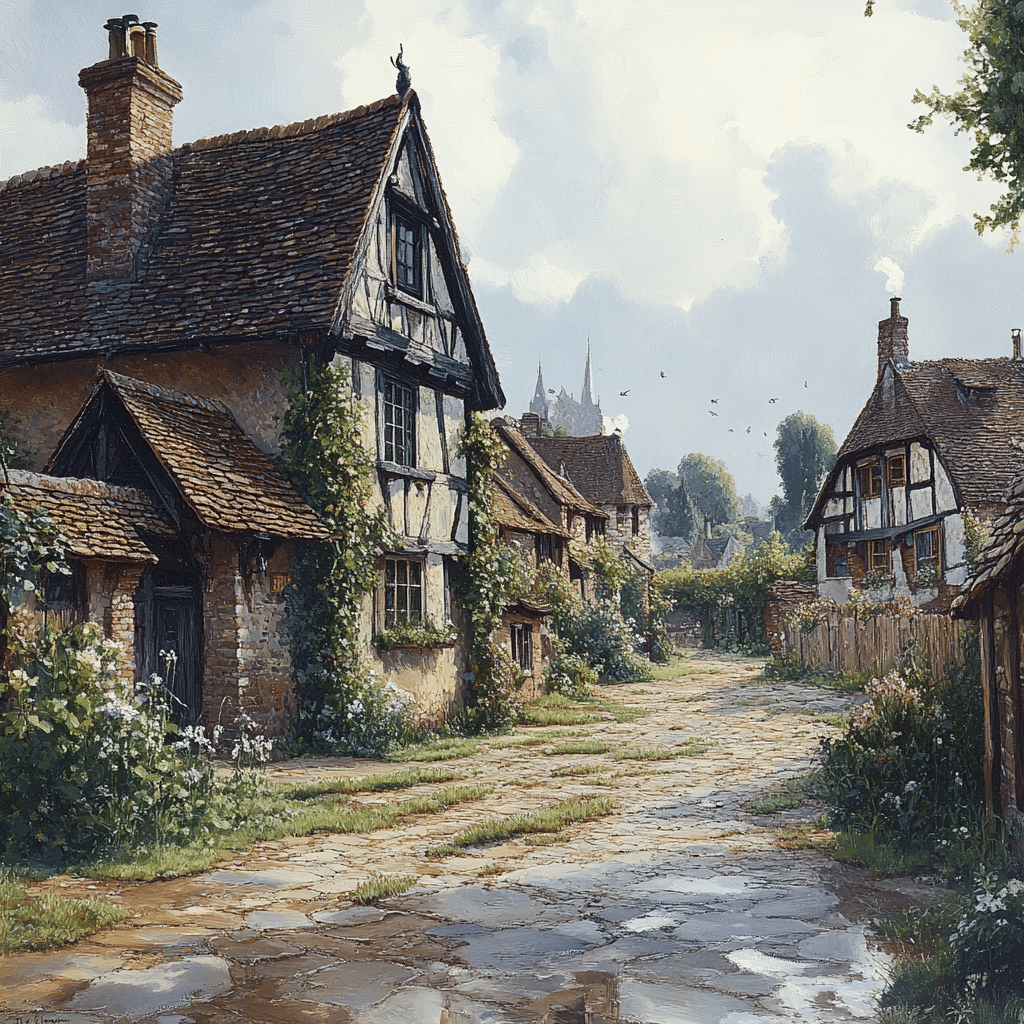Cleobury Mortimer, renowned for the iconic twisted spire of its 12th-century St. Mary’s Church, may be one of South Shropshire’s smaller towns, but it boasts a captivating history and cultural heritage. Famed for its distinctive architecture and picturesque setting, Cleobury Mortimer draws history enthusiasts and casual visitors alike. With such a rich background, let’s delve deep into the multifaceted story of its celebrated church spire.
The Origins of Cleobury Mortimer’s Iconic Church
Early Foundations and Construction
St. Mary’s Church, the pride of Cleobury Mortimer, has stood the test of time since its construction in the 12th century. Built during the Norman consolidation of England, the church was commissioned by local nobility eager to assert their dominance and showcase their religious devotion. Archival records reveal detailed plans for the church, with its grand stonework meant to last for centuries. The use of cutting-edge (for its time) architectural techniques displays the ambition and resources poured into its foundation.
The Evolution Over Centuries
St. Mary’s has witnessed numerous phases of enhancement and reconstruction since its initial creation. By the 15th century, the church underwent significant expansion, including the addition of the tower. This tower, which would later house the famous twisted spire, marked a pivotal development in its history. Recent archaeological diggings have unveiled relics and structural changes that bear testament to the various periods of rebuilding and the community’s unwavering efforts to maintain the church’s grandeur.

The Twisted Spire: An Architectural Enigma
Structural Analysis of the Twisted Spire
The twisted spire is Cleobury Mortimer’s most distinguishing feature, drawing both awe and curiosity. Preservation architects from Historic England undertook an in-depth structural analysis to determine the cause of the spire’s unconventional shape. Contrary to myths of flawed craftsmanship, dendrochronological studies establish that the use of green timber, combined with the natural ageing process, resulted in the spire’s iconic twist. This discovery dispels long-held assumptions and pays homage to the medieval workmanship that endures through centuries.
Comparison with Other Twisted Spires
While unique, St. Mary’s twisted spire is not alone in England. Chesterfield’s Church of St Mary and All Saints, and St Lawrence’s Church in Warkworth, also boast similarly contorted spires. These rare architectural quirks add charm and historical depth to their respective towns, much like Cleobury Mortimer. However, St. Mary’s spire remains an unparalleled symbol of the local community’s historical tapestry, reflecting their resilience and pride.
| Category | Details |
| Location | South Shropshire, England |
| Population | 1,962 (according to the 2001 census) |
| Status | Town, although often compared to a village |
| Parish Council | Cleobury Mortimer Town Council |
| Governance | Under the jurisdiction of Shropshire Council |
| Historic Landmark | St. Mary’s Parish Church with its distinctive twisted spire |
| Century of Landmark | 12th Century |
| Notable Feature | Second smallest town in South Shropshire |
| Nearby Accentuations | Rolling countryside, historic buildings, local amenities |
| Economy | Rural economy, small local businesses provide services |
| Transport Links | Access via local roads, proximity to larger towns |
| Cultural Significance | Historic and architectural interest due to St. Mary’s Church |
| Visitor Attractions | Heritage walks, local pubs, countryside activities |
| Educational Facilities | Primary and secondary schools within the vicinity |
The Role of Cleobury Mortimer’s Icon in Local Culture
Religious and Civic Significance
St. Mary’s Church has been more than a place of worship; it’s a cornerstone of civic life. From medieval town gatherings and market days to modern festivals, the church has consistently been at the heart of Cleobury Mortimer’s communal activities. The parish council plays a vital role in managing these activities, ensuring the church remains a vital part of the town’s social fabric. This blend of religious and civic functions emphasizes the church’s evolving role over centuries.
Influence on Local Art and Literature
The twisted spire has inspired many artists and writers, casting a long shadow over local culture. Notably, author P.D. James referenced such ecclesial structures in her works, reflecting how these architectural marvels shape narratives and imagination. Contemporary artists, through interviews, share how the spire’s image influences their creations, making it an enduring muse for regional cultural expression.

Preservation Efforts and Modern Challenges
Conservation Projects
Preserving the twisted spire is no mean feat. Recent conservation projects, funded by the National Lottery Heritage Fund, focus on treating wood decay and addressing masonry erosion. These efforts ensure that future generations can continue to admire this architectural wonder. This funding has been crucial in combating the natural wear that time imposes on such ancient structures.
Balancing Preservation with Community Use
The dual identity of St. Mary’s as both a historical monument and an active place of worship brings unique challenges. The community, together with the Church of England, tactfully balances maintaining the spire’s structural integrity while accommodating contemporary worship practices and civic events. This delicate equilibrium highlights the ongoing commitment to preserving the church’s historical significance without compromising its modern-day functionality.
Public Engagement and Education
Fostering public interest is key to sustaining preservation efforts. Initiatives like heritage walks led by the Cleobury Mortimer History Society and collaborative educational programs with schools breathe life into the church’s history for both locals and tourists. Such interactive programs not only educate but also instill a sense of pride and responsibility for maintaining this historical jewel.
Future Prospects for St. Mary’s Church and Cleobury Mortimer
Enhancing Tourism
Cultural tourism offers a promising avenue for Cleobury Mortimer. By promoting St. Mary’s Church as a major attraction, the town can entice a broader audience. Strategic partnerships with tourism boards and travel companies could embed the church within broader itineraries showcasing England’s historical treasures. The spire’s unique appeal makes it a potential highlight in any cultural tour of Shropshire.
Bridging Past and Future
As Cleobury Mortimer grows, integrating its rich history with modern development remains paramount. Preserving landmarks like St. Mary’s Church, while fostering innovation, ensures that the twisted spire continues to symbolize the town’s historical and cultural pride. The commitment of the community, combined with strategic planning, will allow Cleobury Mortimer to flourish as a bridge between the past and the future.
Drawing the story of the twisted spire to a close, it is clear that St. Mary’s Church is more than a relic. It forms a timeless connection between Cleobury Mortimer’s storied past and its vibrant present, symbolizing resilience, community coalescence, and continuity amid time’s relentless march. The church not only inspires pride but also stands as a testament to the town’s indomitable spirit.
Cleobury Mortimer: Unveiling the Secrets of Its Twisted Spire
Ever heard of Cleobury Mortimer, the charming English town with its extraordinary twisted spire? This iconic 12th-century church feature isn’t just a pretty sight; it’s steeped in rich history and quirky facts that’ll leave you marveling.
A Spiraling Wonder
Cleobury Mortimer’s spire has an intriguing twist to it—literally! Unlike the scenes of grandeur in Chronicles of Downton Abbey: A New Era, the twisted spire of St Mary’s Church is anything but straightforward. It was constructed in the 14th century and has baffled architects ever since. The unique spiral has sparked numerous theories, from strategic design choices to the shrinking wood phenomenon. Regardless of the reason, it stands proudly, a testament to quirky medieval engineering. Talk about standing out!
Historical Tidbits
Interestingly, Cleobury Mortimer isn’t just known for its twisted spire. The town holds deep historical significance. Consider the transformation of small towns like Chulmleigh into vibrant communities; similarly, Cleobury Mortimer evolved from a simple settlement into a historical hub. Did you know that the spire actually leans to one side? Some say it leans towards the market square, a detail woven into the town’s fabric over centuries, much like the carefully crafted gameplay strategies of the DC Defenders.
A Place Steeped in Stories
Walking through Cleobury Mortimer, it’s easy to feel transported to another era. It’s dotted with ancient buildings and tales as rich as those behind the Lord Baltimore hotel. One interesting fact: the town had a peculiar rule during the Middle Ages that required pub landlords to provide free beer to locals during special celebrations. Perhaps, it’s a tradition to recall while exploring tips on How To treat red face From alcohol.
Modern Twists
This historic town is a real gem, much like the surprising yet profound career path of former football player Chris leak. Today, Cleobury Mortimer balances its historical allure with modern touches. It’s a delightful mix that continues to draw tourists, historians, and curious minds alike. Cleobury Mortimer remains an enchanting destination, embodying an uncommon charm—showing history is not just in books, but alive in the twisted spires and cobbled streets of this quaint town.
The Quirky Gems
There you have it! Cleobury Mortimer is a treasure trove of fascinating tidbits and historical glitches. From the extraordinary twisted spire to its unique rules and vibrant evolution, this town’s stories are a testament to its enduring intrigue. Don’t wait; let Cleobury Mortimer captivate you with its unique charm—you won’t be disappointed!

What is Cleobury Mortimer famous for?
Cleobury Mortimer is best known for the twisted spire of its 12th-century St. Mary’s Parish Church. It’s a quaint town that feels more like a village, with a population of just 1,962 people as of the 2001 census.
What council is Cleobury Mortimer?
Cleobury Mortimer falls under the Cleobury Mortimer Town Council within the jurisdiction of Shropshire Council.
What is the history of the Mortimer Forest?
Mortimer Forest has a rich history, dating back to ancient times. It was named after the Mortimer family, who were influential in the region during the medieval period. The forest is a mix of natural beauty and historical significance.
What county is Cleobury?
Cleobury Mortimer is located in the county of Shropshire.
What council is Hamilton Island in?
Hamilton Island falls under the jurisdiction of the Whitsunday Regional Council in Queensland, Australia.
Who are the council members of Queen Creek?
Council members of Queen Creek are elected officials who serve on the Town Council. Their roles include making important decisions for the community and representing residents’ interests. Specific names of current members would need to be checked on the town’s official website or local resources.



